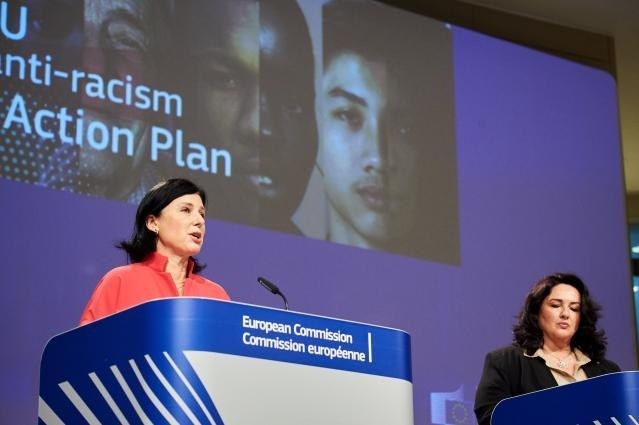The European Commission presented last week an EU action plan against racism for the next five years.
The Commission intends to ensure that member states fully implement relevant EU law and further strengthen the legal framework, if needed.
The action plan follows the State of Union Address by President Ursula von der Leyen on 16 September when she underlined that it is time to build a truly anti-racist Union that goes from condemnation to action. She quoted the Northern Irish politician John Hume who used to say that conflict was about difference and that peace was about respect for difference.
In her speech, von der Leyen also said that the Commission will propose to extend the list of EU crimes to all forms of hate crime and hate speech – whether because of race, religion, gender or sexuality. “Hate is hate – and no one should have to put up with it.”
According to the action plan, the Commission will undertake a comprehensive assessment of the existing legal framework to determine how to improve implementation, whether it remains fit for purpose, and whether there are gaps to be filled. On important piece of legislation is the Framework Decision on combating racism and xenophobia by means of criminal law.
“Serious concerns exist about the extent to which national criminal codes correctly criminalise hate speech and hate crimes.” As a matter of priority, the Commission will make a comprehensive effort to ensure a full and correct transposition and implementation of the Framework Decision across the EU.
Member states will also be encouraged to adopt national action plans against racism and racial discrimination by the end of 2022. By the end of 2021, the Commission, working with national experts, will put together the main principles to produce effective national action plans and will deliver a first progress report by the end of 2023.
Other measures mentioned in the action plan include awareness raising and addressing racial and ethnic stereotypes through media, education, culture and sport; and improved collection of data disaggregated by ethnic or racial origin. The Commission will also launch an annual designation of European capital(s) of inclusion and diversity and organise a summit against racism in spring 2021.
The Commission will also appoint a coordinator for anti-racism in addition to the current coordinators on combatting antisemitism and anti-Muslim hatred. Internally, the Commission will increase diversity of EU staff by improving the representativeness of staff through measures targeting recruitment and selection.
At a press briefing on Friday (18 September), Vera Jourová, Vice-President for Values and Transparency, said that progress in fighting racism has not been enough and that she hopes that the tide in Europe can be turned. “We simply want member states to do more in fighting racism.”
“With this action plan, we acknowledge that racism is not only perpetrated by individuals but is also structural,” said Helena Dalli, Commissioner for Equality. No-one is born a racist but people become racists when their perceptions of others are confused with reality. Addressing racist stereotypes is difficult and national action plans will be of the utmost essence.
A complicated issue is hate crime in its different forms. Is the burning of books sacred to religious communities, such as the recent burning of the Koran in Sweden, protected by freedom of expression? Are “antisemitic carnival costumes openly parade on our streets”, mentioned by President von der Leyen in her speech, an expression of artistic freedom? She was referring to the carnival in Aalst.
Asked by The Brussels Times if incidents like these will be criminalised, Vice-President Jourová replied that criminal law is the prevailing domain of the member state but did not exclude the possibility of EU-wide legislation in the framework of the review of the current Framework Decision. “If we want to introduce EU-legislation, we need a strong legal basis and justification,” she explained.
There must also be a political will among member states to accept the legislation because it is a sensitive area with shared competencies. “We are discussing whether we should start a debate with the member states on the possibility of enlarging the scope of the legislation on EU-level against hate crime. Such legislation could be introduced already next year.”
M. Apelblat
The Brussels Times

